Now, the more dearly a thing is loved according to nature, the more perfect it is to despise it, for the sake of Christ. Nothing is dearer to any man than the freedom of his will, whereby he is lord of others, can use what he pleases, can enjoy what he wills, and is master of his own actions. Just, therefore, as a person who relinquishes his wealth, and leaves those to whom be is bound by natural ties, denies these things and persons; so, he who renounces his own will, which makes him master, does truly deny himself.
St. Thomas Aquinas, On The Perfection Of The Spiritual Life
It’s been a while since I wrote something related to Neon Genesis Evangelion. I’ve barely written much about it on this blog, even though it’s one of my favorite anime of all time, so I hope this post will make up for that lack of content. Anyhow, this post will focus on the character of Shinji Ikari, the lead protagonist and the main focus of the story. He’s a character that’s often seen as polarizing and often on the receiving end of criticism and, in some cases, scorn due to his untypical, unassuming behavior, in contrast to other mecha heroes. His personality is not based on being a brave soldier, who’s willing to risk his life to defend his nation and principles; nor is he someone who’s remembered for his enthusiasm and strong willpower. Rather, he’s a sullen, self-deprecating, and melancholy person whose life is in shambles thanks to a double-traumatic incident where he loses his mother to a freak accident, and is subsequently abandoned by his father.
Shinji’s experiences, from before the show’s events and during them make him into a very negative person. His self-imposed vicious cycle of self-hatred causes him to develop psychological issues which are explored in parts of the show, and soon the show shifts from that about an apocalyptic battle against the Angels, to that of a spiritual warfare between Shinji and his inner self, part of which largely evokes the call to self-denial, described as one of the core spiritual practices of the Christian faith.
WHAT DOES IT MEAN TO “DENY ONESELF”?
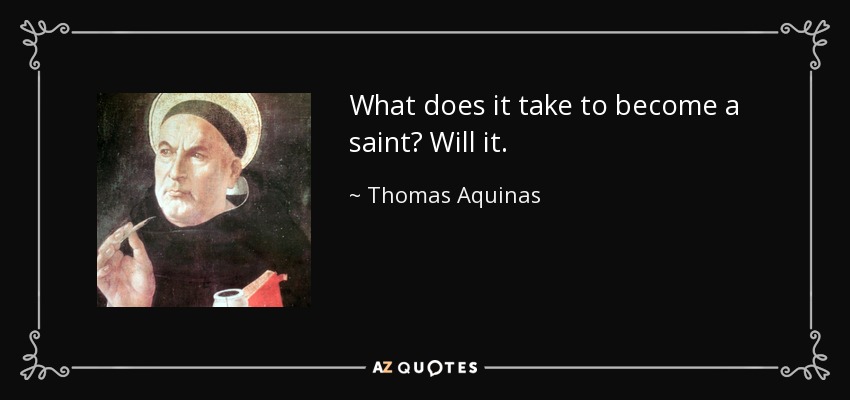
The spiritual practice of self-denial, originating from Scripture, is best characterized in the 16th chapter of the gospel of St. Matthew; the same one in which Christ bestows upon St. Peter the foundation of the Church, and future charge of the flock as the first Pope. Six verses after that declaration, Christ commands to His Apostles: “…If any man will come after me, let him deny himself, and take up his cross, and follow me. For he that will save his life, shall lose it, and he that shall lose his life for my sake, shall find it.” (St. Matthew 16:24-25).
What does it mean to deny oneself? It means to prioritize following Christ in our daily lives, doing so by subjugating our mindset to correspond to what He desires first and foremost. St. Thomas Aquinas, in the tenth chapter of On The Perfection Of The Spiritual Life describes the path as follows:
This practice of salutary self-abnegation, and charitable self-hatred, is, in part, necessary for all men in order to salvation, and is, partly, a point of perfection. As we have already seen from the words of Dionysius quoted above, it is in the nature of divine love that he who loves should belong, not to himself, but, to the one beloved. It is necessary, therefore, that self-abnegation and self-hatred be proportionate to the degree of divine love existing in an individual soul. It is essential to salvation that a man should love God to such a degree, as to make Him his end, and to do nothing which he believes to be opposed to the Divine love… But in order to attain perfection, we must further, for the love of God, sacrifice what we might lawfully use, in order, thus to be more free to devote ourselves to Him. It follows, therefore, that self-hatred, and self-denial, pertain to perfection.
St. Thomas Aquinas, On The Perfection Of The Spiritual Life
One might be surprised to see St. Thomas Aquinas use such bold words like “self-hatred” here; especially considering its strongly negative connotations and links to depression. Yet, this is not entirely the type of self-hatred that the Christian philosopher tries to speak of. The self-hatred here is one in which we wage battle against ourselves so as to confirm our acts, thoughts, and desires to not act rashly upon selfish wants; resisting idleness and the temptation to conform to the crowd; and setting their sights on serving primarily, Jesus Christ, the perfect teacher. Some examples in which this is accomplished is through renouncing hedonism, succumbing to one’s own sexual fantasies, or idolizing materialistic principles.
Self-denial is something that many spiritual writers say is a necessary step to achieving Christian holiness. As deep as this concept goes, actually practicing this virtue is more or less, easier said than done. In the case of Shinji Ikari, we see him undergo this tenuous journey of embracing self-denial starting from the 16th episode of Neon Genesis Evangelion; from which the internal confrontation between him and his thoughts make their first abstract display.
CONVERSATIONS WITH THE SELF
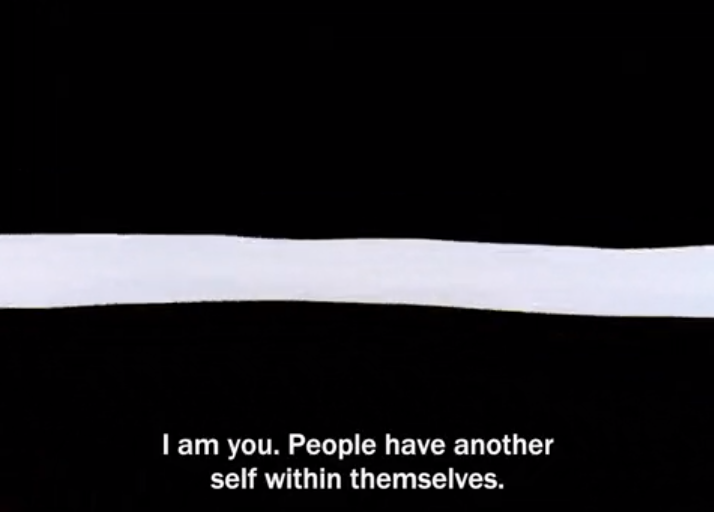
After successfully defeating a string of Angels, Shinji, overconfident in his newfound, but extremely misplaced pride in having improved his piloting skills, gets a harsh taste of humility when he is absorbed into the Angel he was fighting. Trapped within, he undergoes what can only be described as a harsh psychological inquisition, and must come to terms with his own feelings and the reality that lies before him in the form of his inner self, (hereafter Fake-Shinji), who describes himself as:
Fake-Shinji: I’m Shinji Ikari… the other version of you that exists within themselves. In fact, what makes up Shinji Ikari is actually two people: the exterior version, and the one observing that.
Fake-Shinji’s introduction
In this we see the very division of Shinji’s two personalities: who he perceives himself to be according to the way he currently is, and his inner conscience, whom he comes into contact with, and endeavors to give an honest evaluation of himself. This appears to echo St. Paul, who says: “For if you live according to the flesh, you shall die: but if by the Spirit you mortify the deeds of the flesh, you shall live.” (Romans 8:13) One can see a semblance between Fake-Shinji with that of the Holy Ghost; the latter, just like the former, work as their conscience. Catholics are said to receive within them the Holy Ghost during the sacrament of Confirmation, and with it the gift of the grace to assist them in leading them towards a path of righteousness. The strength to fight temptation, and increase the love of God within them also is built up through the Holy Ghost’s presence.
The conversation between Shinji and Fake-Shinji offers a better outlook into the crux of his terminal despair. We learn that he’s only recently found some solace in piloting Evangelion Unit-01, not because he enjoys it, but because he seeks his father’s approval. Only by others accepting him, and without him having to make the first move, can he only find some kind of recompense at living. Without it, he is reduced to nothing. This is accompanied by visions of Asuka, Rei, and Misato criticizing his line of thought, and how irrational it is. Rightfully, the Fake-Shinji also calls him out on this apparent cowardice:
Fake-Shinji: You’re seriously going to stake your entire happiness on your father’s praise? You’re only going to deceive yourself on that?
Shinji: Why not? If I believe in those words, then I can keep on living. Isn’t that how everyone survives? The world is full of hardship, pain, and suffering anyways.
Fake-Shinji: Just like how you tell yourself that you can’t swim?
Shinji: Humans weren’t made to float! Call it self-deception if you want, but that’s the fact.
Shinji tries to weasel his way out of Fake-Shinji’s criticism
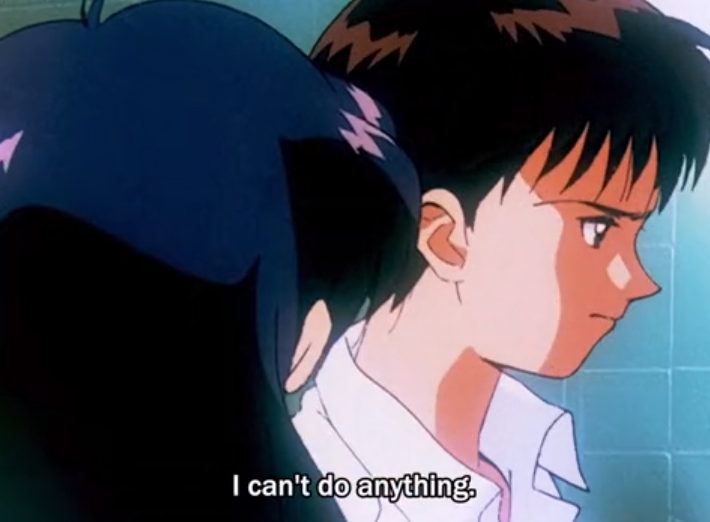
Here, Shinji is so attached to the idea of self-satisfaction by others, that he reacts angrily when Fake-Shinji tells him how inconsistent his goals are; thus, by refusing to mortify himself of his own selfish needs, he suffers only more. When Fake-Shinji tells him that he mustn’t run away from his problems, Shinji denies his problems. On the call to not let anyone dictate how you should live your life, or how to act, think or feel, Shinji refuses to acknowledge it. Considering that his synchronization rates, which determine how functional he can operate his Evangelion unit, was at an all-time peak; his involvement with NERV, the organization behind the Evangelions, makes him somewhat successful at making friends with Asuka, Toji, and Kensuke from his school, and allows him to reconnect with his father, and form some kind of tangible bond between their shared love for Yui, it’s no wonder that he finds himself cornered by his conscience’s call to resist attaching his identity to vain accomplishments.
Therefore, he’s not willing to part with these not because he is physically incapable of such; he can, but the problem is he doesn’t want to. All he wants is the “easy way out” of the suffering life that he’s faced, and for him piloting the Evangelion offers him that solace. Were he to remove it, he’ll only have a shell of himself which has nothing else to offer. That’s why he’s so bothered by his conscience and struggles to silence it.
Fake-Shinji: There you are, running away again. You know, you can’t just close your eyes and deafen yourself whenever something gets difficult. Life isn’t full of pleasurable moments linked together.
Shinji: Who cares what you say? I’ve finally found something I enjoy in piloting the EVA. Finding something you like, and devoting your life to it: tell me, what’s wrong with that???
Shinji refuses to give up his inordinate desires
In contrast, the Christian is expected to be ready to accept, for the sake of God, the rejection of anything that could pose a stumbling block to their relationship with Him, no matter what it takes. As St. Thomas Aquinas says on the martyrs, experts of self-denial:
Our Lord would not have us to think that we are to deny ourselves, only so far as to endure insults and hard words. He shows us that we are to deny ourselves unto death, even unto the shameful death of the cross. For He says: “Let him take up his cross and follow Me.” We, therefore, say that the martyrs did a most perfect work; for they renounced, for the love of God, life itself, which others hold so dear, that, for its sake, they are content to part with all temporal goods, and are willing to purchase it by any sacrifice whatsoever. For a man will prefer to lose friends and wealth, and to suffer sickness, or even slavery, rather than to be deprived of life.
St. Thomas Aquinas, On The Perfection Of The Spiritual Life
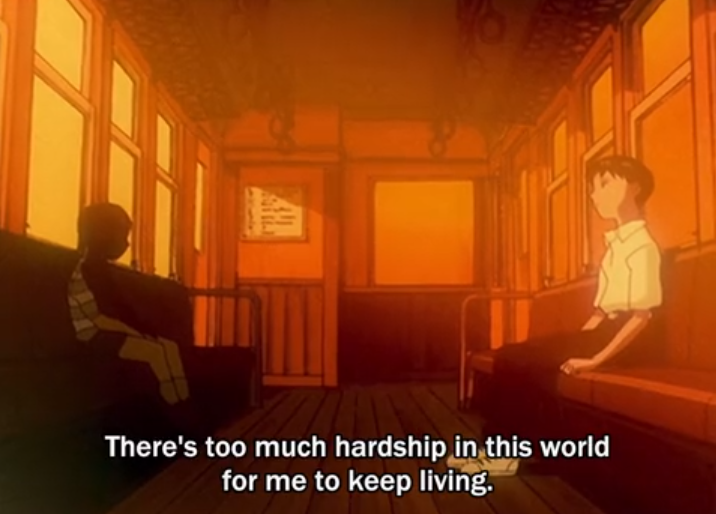
More often than not, we find the idea of giving up our needs in place of God’s, to be a scary thought, since they’re part of our identity, or something we hold dear. Practicing self-denial requires a lot of virtue and self-discipline: it’s a difficult practice to assume. Even Christ foresaw it when saying “Enter through the narrow gate. For wide is the gate and broad is the road that leads to destruction, and many enter through it. But small is the gate and narrow the road that leads to life, and only a few find it.” (St. Matthew 7:14) But it’s key to note that for the Christian, that to love God with all their heart and all their mind, is to put Him first – just like Shinji is asked to do in this episode. When he refuses to deny himself his needs, it only accelerates the disasters that await him in the rest of the story – the following events summarize this.
A RUDE AWAKENING: EPISODE 17 AND BEYOND
After Shinji rejects his conscience’s plea to change, the series, which up until this point has taken the form of a typical mecha anime, starts to take a dark turn, with him in the driver’s seat for it. He becomes less confident in his skills, which causes him to freeze up and watch as Toji, the only good friend he’s had in school, is brutally torn to shreds by his very own unit. His relationship with his father deteriorates to the point that he vows never to see him. Kaworu’s death in episode 24 which spirals him to his absolute lowest point, with no one around to comfort him. At this point Shinji is still seeking answers as to why things aren’t happening the way he wants them to go, and thus causes him to fall deeper into his own pit.
This takes us to End of Evangelion; he frequently continues to resist the will to survive, to the point he’d let a JSSDF soldier shoot him without a fight. He refuses Misato’s final plea for him to realize that he has one last chance to turn over a new leaf, and decides that since he can’t live anymore, no one else can. The destructive effects of his volition ironically lead him to an epiphany of what it means to live; not to take comfort in his own pleasure only, but to also endure the hardships too, thus sweetening his worldview and freeing him from his longstanding pain.
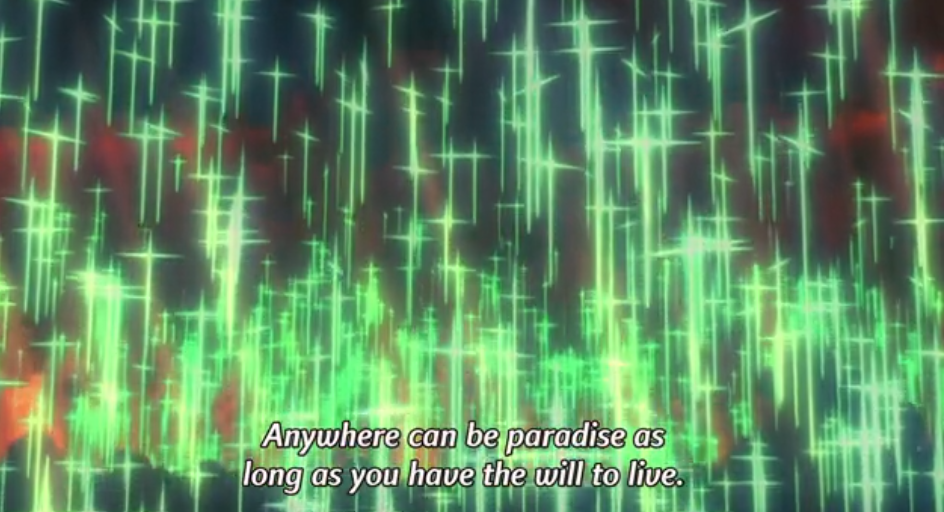
It’s just as St. Thomas Aquinas intended by “charitable self-hatred” in the Christian; Shinji finally comes to hate who he was in the past 24 episodes, and revamps himself towards a newfound goal. He ends the Human Instrumentality Project, which he caused with his suffering, and intends to shed away the old, self-loathing personality he once engendered, and embrace a new, slightly more optimistic version of him. In effect, Shinji has realized what Christ intended by his command in St. Matthew 16:24-25. He repudiates his desire to be loved by others, and seek out their validation; he embraces life for what it is, the good and bad packaged into one, and sets out to follow through with a higher standard of living, which appreciates life for the beauty within. Herein lies the core of Christian self-denial; to subject oneself towards the love of God and His Divine Will.
Shinji: All my life I’ve only ever felt pain, so the best thing I could do was to run away from it. Even that was unsatisfactory, because all I could see in that place was my own loneliness… I know that I’ll be betrayed and hurt again. But even then, I don’t mind it, because I’ll know at least, that what I felt was real then and now.
Shinji reverses Human Instrumentality, and in turn, denies his old self
CONCLUDING REMARKS
In my experience, self-denial is a challenging virtue to practice, because often times I find what I want finds conflict with what God wants for me, it’s hard to reconcile them at times. I could see this as well in Shinji’s arc; he finds it tough to surrender to his conscience’s dictations, and as a result of his negligence ends up further alienating himself from reality. One ought to think, how different would the show have gone if he had humbled himself, taken accountability, and followed the advice outlined in episode 16? Perhaps the events of End of Evangelion, specifically Third Impact, might have turned out differently. Maybe he would have had a happier ending.
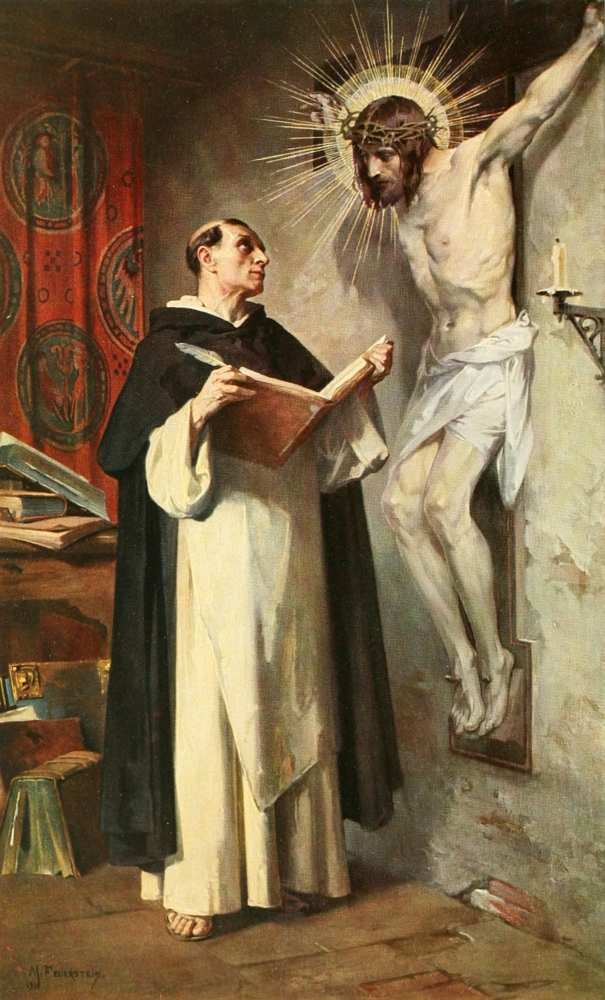
Just as he realized that, in the end, the error of his inordinate desires, and sets himself to mend all the damage he has caused to himself and the world, Traditionalist Catholics too can hope to accord their lives to God’s plan – and in doing so, resist the urge to end up in the wrong place for following our disordered wants. It was exactly this that St. Thomas Aquinas committed himself to during his holy life, and this story will prove such. One day, while praying before an image of Christ Crucified, he began to experience a vision of Our Lord, who spoke: “You have written well of me, Thomas. What is it that you desire?” Instead of asking God to give him earthly recognition or riches, St. Thomas replied humbly: “I desire nothing but you, O Lord.” (in Latin, non nisi Te, Domine). A true disposition of self-denial right here, folks.
This was also the line of thinking found in St. Alphonsus Liguori’s treatise, Uniformity With God’s Will. I’ve only discovered it last month, but I can’t imagine how I could have needed this book much more than ever, with its lesson on following what God wants for us in the good and bad, rather than seeking our own, and I can’t help but re-read it and meditate on what it says. In fact, thanks to this book I’ve decided to start a new series next month where I examine some of the precepts found in this book, and how certain anime characters have lived this out in their arc.
Happiness is secured through virtue; it is a good attained by man’s own will.
St. Thomas Aquinas

What’s your baptismal name? I just feel weird calling you weeb because it sounds like an insult to me to use it as a nickname – I mean the word, phonetically, not trying to dig at anime or whatever but… if you don’t want to tell me I have a name picked and we’ll go with that. But you don’t get to know what it is in advance =P
Anyway I like this post.. hold on… there ‘like’ clicked! How and ever I take objection (sorry I hone in quickly on objections, but actually I think that’s quite a Catholic thing to do…) to this:
‘Traditionalist Catholics too can hope to accord their lives to God’s plan…’
Why do you need the word traditionalist there? Can any Catholic not hope to accord their life to God’s plan?
God bless!
LikeLiked by 1 person
Thanks Máire! I’m glad you liked it.
Of course! Any Catholic can accord their life to God’s plan, as long as if they will it within them. My apologies if I tried to make it seem too underhanded, that wasn’t my intention. That being said I should probably change out of that habit of using that moniker (as I’ve been using it for a while now).
If you don’t want to call me “weeb” that’s fine, you can call me TCW instead (as few others have). At the current moment I prefer to remain anonymous.
God bless you too! ☺️
LikeLike
I understand wanting to remain anonymous blogging, and actually TCW was what I was calling you in that blog post I never finished writing! However it’s still quite impersonal so I’m going to call you Chris, on account of your devotion to St Christopher… Would that annoy you?
Nah it wasn’t underhanded or something I took offence at. I bring these things up because I find them divisive and what divides the Church hurts Jesus… and when I say divisive I don’t mean it in the sense that it’s often used these days. That is you point out something is heretical or just plain wrong and suddenly you’re branded as ‘divisive’ in the name of ‘inclusivity’. That’s nonsense, some things just have to be pointed out and dealt with. But when there’s a kind of exclusivity on the basis of legitimate differences… it can cause actual unnecessary division and it’s sad. And it seems to me to be a case of both sides lacking humility and a willingness to listen and engage.
This is the whole reason I kept starting and stopping with writing blog posts on the issue. Not only is it something that seems to require a book to begin to touch on things, but it’s deeply personal for me. I kinda feel like in recent times I’ve been put in a position where I’ve one foot in Rome and the other in Écône and the gap between the two just keeps getting wider and stranger… But if the gap isn’t bridged I can see it resulting in the kind of schism that will not only make what is happening round the German synod seem insignificant… But I feel it has the potential to overshadow even the reformation itself… And the strange thing is nobody else seems to really see or or be concerned overmuch, I guess maybe that makes it my imagination…
My Novus Ordo friends sometimes get a little suspicious as to whether I’m getting too radically traditional. The people i met at the FSSPX chapel seemed to feel they had a mission to stop me going to NO Mass… but I don’t really have an interest in either ‘camp’, only in Jesus! To be Catholic is to be part of a Church that is Universal or it is nothing. You can’t take any one of the four marks of the Church away and then keep going as if nothing has happened, it doesn’t work like that.
Anyway that’s my thoughts. A little rambling and inconclusive, but at least I’m finishing and posting the comment!
God bless and keep you
LikeLiked by 1 person
Likewise! May He keep you close to Him at all times too.
I understand, spirituality ought to be more focused on, not just only the dogmatic ones. Of course you’ll have to balance them though. At the end of the day, Thomas A Kempis’ words ought to be heeded (and this is something I am still working on myself):
“What doth it profit thee to enter into deep discussion concerning the Holy Trinity, if thou lack humility, and be thus displeasing to the Trinity? For verily it is not deep words that make a man holy and upright; it is a good life which maketh a man dear to God. I had rather feel contrition than be skilful in the definition thereof. ” (Fr. Thomas a Kempis, Imitation of Christ)
I won’t be bothered if you choose to call me by that name or TCW 😁
LikeLiked by 1 person
Thanks Chris! =)
I guess the thing is I don’t feel I’m opposing spirituality with dogma. Nobody has really given me any dogmatic reason to shift from where I am…
God bless
+
LikeLiked by 1 person
I agree, I don’t see a problem with your views either. Hold firm to your Faith always!
God bless you too 😃
LikeLike